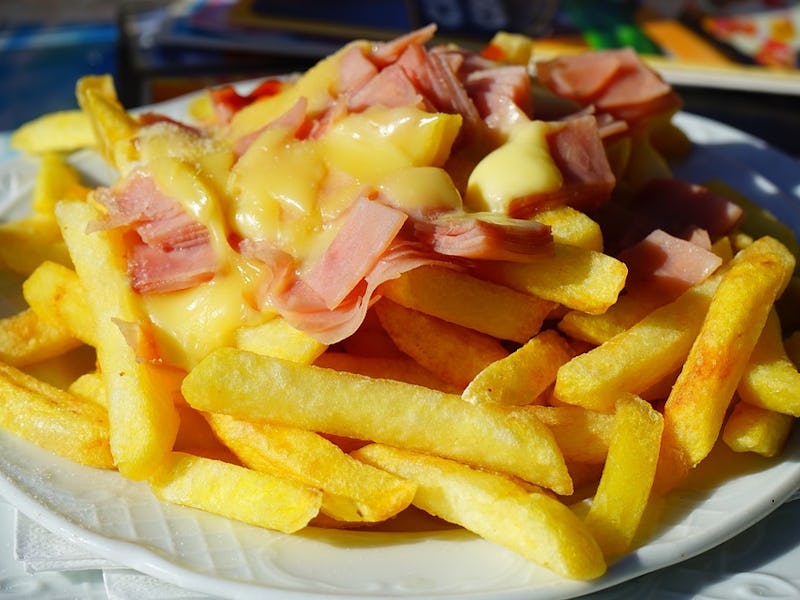'Drunchies' Study Explains Why All Your Favorite Hangover Foods Don't Help
"I think my new slogan is 'Have fun, don't die'."

Everything you know about hangover cures, foods that “soak up alcohol,” and the magic of a good post-binge brunch is probably wrong, according to new research released Tuesday. No, the team behind the paper wasn’t out to ruin the tastiest part of your hangover. They had far nobler intentions, conducting their study to combat a slew of fast food ads targeting drunk college kids. As they discovered, those “cures” are about as unhealthy as binge drinking itself.
Before she began this study, published in the Californian Journal of Health Promotion, Jessica Kruger, Ph.D., clinical assistant professor of community health and health behavior in the University at Buffalo’s School of Public Health and Health Professions, was flipping through a newspaper in a midwest college town when she noticed an ad that read: “Got drunchies?”
Intrigued, she and her colleagues turned to Urban Dictionary, where their suspicions were confirmed: Drunchies are simply drunk munchies. “And we said, “We have to study this!’” Kruger tells Inverse.
The urban dictionary definition of drunchies that inspired this study
“No one has looked at this before, and there’s advertising and marketing that’s really getting a hold of this,” she continues. “But what is the impact on health if people are consuming lots of alcoholic beverages and then making these unhealthy decisions?”
To answer this question, Kruger surveyed 286 college students not only about their drinking habits but also about their food choices that go along with those habits. While self-reported surveys — particularly those that ask participants to recall drunken choices — aren’t the most perfect way of measuring behavior, these surveys were thorough enough to paint a general picture.
After four or five drinks, nearly all the students ate something before going to bed, and there were patterns to the types of food they gravitated toward. For instance, they were less likely to consume milk, sweets and snacks and more likely to eat foods rich in protein or “mixed dishes” (spanning multiple food groups) like tacos. Those preferences persisted into the next day: Even the morning after, people were more likely to eat “salted snack foods” or pizza rather than “milk and dairy products, grains, sweets and snacks, fruit, non-alcoholic beverages, fats and oils, and sugars.”
There are biological mechanisms that might drive these food choices, at least when it comes to choosing food when you’re already drunk, says Kruger. Drinking alcohol initially causes blood sugar levels to spike (though in patients who drink excessively or have diabetes it can actually cause blood glucose levels to fall dangerously), but that rise is followed by a quick drop:
“That drop is due to your body trying to detoxify itself due to alcohol, basically,” Kruger says. “That brings up that feeling of hunger in order to try to regulate that blood glucose in your bloodstream.”
She hypothesizes that most drunk students turn to calorie-dense foods because of “old wives tales” or “hangover cures” that get passed on in a social context but have little to no scientific merit. A popular myth, she notes, is that eating dense food can “sop up” the alcohol. This doesn’t actually happen, she explains, simply because your body processes the alcohol first before moving onto your calorie-rich meal.
In response to this, Kruger has new advice that she gives her students that works to delay the onset of the munchies. Drink a lot of water. In particular, she advises that students try to drink one glass of water per alcoholic drink.
But because she teaches college students, Kruger knows that she’s likely fighting an uphill battle. So she’s boiled her advice down into a short motto that she hopes may stick with them, or even remind them of the importance of her findings. “I think my new slogan is ‘Have fun, don’t die,’” she says.